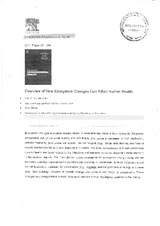| dc.description.abstract | Ecosystem changes can affect human health in several forms, most of them indirectly. Degraded ecosystems can affect water quality and availability, and cause a decrease in food production, climatic instability, poor protection against natural hazards (e.g., floods and storms), and loss of natural landscapes for aesthetic enjoyment. However, the most conspicuous and well-understood risks to health are those related to the infectious and parasitic deseases, especially those endemic in the tropical regions. The main driving forces responsible for ecosystem change today are the economic activities implemented to provide basic materials for livelihoods, such as a agriculture and animal husbandry, materials for construction (e.g., logging), and the provision of energy and water (e.g., dam building). Impacts of climate change also pose a new threat to ecosystems. These changes are taking place in a more rapid and intensive form in developing countries in the tropics. | es_ES |

